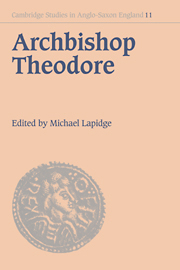Book contents
- Frontmatter
- Contents
- Preface
- List of abbreviations
- 1 The career of Archbishop Theodore
- 2 The Syriac background
- 3 Theodore of Tarsus and the Greek culture of his time
- 4 Rome in the seventh century
- 5 Theodore, the English church and the monothelete controversy
- 6 The importation of Mediterranean manuscripts into Theodore's England
- 7 Theodore and the Latin canon law
- 8 The Penitential of Theodore and the Iudicia Theodori
- 9 Theodore and the Passio S. Anastasii
- 10 Theodore and the Laterculus Malalianus
- 11 Theodore and the liturgy
- 12 Theodore's Bible: the Pentateuch
- 13 Theodore's Bible: the gospels
- 14 Theodore and Anglo-Latin octosyllabic verse
- 15 The Canterbury Bible glosses: facts and problems
- Index
15 - The Canterbury Bible glosses: facts and problems
Published online by Cambridge University Press: 03 May 2010
- Frontmatter
- Contents
- Preface
- List of abbreviations
- 1 The career of Archbishop Theodore
- 2 The Syriac background
- 3 Theodore of Tarsus and the Greek culture of his time
- 4 Rome in the seventh century
- 5 Theodore, the English church and the monothelete controversy
- 6 The importation of Mediterranean manuscripts into Theodore's England
- 7 Theodore and the Latin canon law
- 8 The Penitential of Theodore and the Iudicia Theodori
- 9 Theodore and the Passio S. Anastasii
- 10 Theodore and the Laterculus Malalianus
- 11 Theodore and the liturgy
- 12 Theodore's Bible: the Pentateuch
- 13 Theodore's Bible: the gospels
- 14 Theodore and Anglo-Latin octosyllabic verse
- 15 The Canterbury Bible glosses: facts and problems
- Index
Summary
The ‘Leiden Glossary’, preserved in a late eighth- or early ninth-century manuscript from St Gallen (now Leiden, Bibliotheek der Rijksuniversiteit, Voss. lat. Q. 69, fols. 7–46, at 20ra-37ra, referred to hereafter as Ld.), is a primary source for the history of Anglo-Saxon education, since its chapters or lists of glossae collectae, many with Old English interpretations, give a conspectus of the books read in the school of Theodore and Hadrian at Canterbury, as Michael Lapidge pointed out in his pioneering article on that school. The linch-pin that connects the ‘Leiden Glossary’ with the school of Canterbury is the reference to Theodore in Ld. xii.40 (‘Cyneris: nablis idest citharis longiores quam psalterium nam psalterium triangulum fit theodorus dixit’), a gloss on the word cinyris in Ecclus. XXXIX.20. As one might expect from the nature of early medieval education, nearly half of Ld.'s forty-eight chapters are devoted to books of the Bible: chs. vii-xxv (23vb-27va) extend from Paralipomenon (Chronicles) through the rest of the Old Testament (including Jerome's prologues and most of the apocryphal books, but not Psalms and Maccabees) to the gospels, and ch. xxix (28vb-29rb) glosses Jerome's commentary on Matthew.
Although Ld. chs. vii-xxv begin and end without any gaps in the manuscript, it is a reasonable hypothesis that they are an incomplete copy of what earlier was a full set of Bible glosses. This hypothesis is supported by related sets of biblical glosses in several other manuscripts.
- Type
- Chapter
- Information
- Archbishop TheodoreCommemorative Studies on his Life and Influence, pp. 281 - 333Publisher: Cambridge University PressPrint publication year: 1995
- 1
- Cited by

